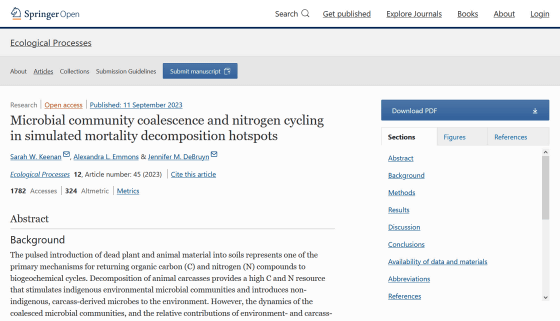Microorganisms that live in the human body continue to live by decomposing corpses even after the person dies.

It is often thought that microorganisms that live in the human body die when the body dies, but in reality, microorganisms continue to live even after the body dies. Jennifer de Bruyn, a professor of environmental microbiology at the University of Tennessee in the United States, explains the important role that microorganisms in the body play in the decomposition of corpses.
Microbial community coalescence and nitrogen cycling in simulated mortality decomposition hotspots | Ecological Processes | Full Text

Your microbes live on after you die − a microbiologist explains how your necrobiome recycles your body to nourish new life
https://theconversation.com/your-microbes-live-on-after-you-die-a-microbiologist-explains-how-your-necrobiome-recycles-your-body-to-nourish-new-life-214048
The human body is home to trillions of microorganisms that help digest food, produce essential vitamins, protect against infections, and perform a variety of other roles important to human health. The intestine, where many microorganisms are concentrated, is a relatively stable and warm environment, and it is also possible to receive a stable food supply.
However, if the human host dies, these microorganisms will no longer be able to continue living in the same environment as before. However, according to research by Mr. De Bruin et al., microorganisms living in corpses play an important role in corpse recycling as a ``necrobiome'' that lives in decaying corpses even after the host dies.

When a person dies, the heart stops circulating blood, and cells deprived of oxygen begin a process called
In addition, anaerobic bacteria , including the Clostridium class of intestinal bacteria, spread throughout the body after death and digest the body from the inside through a process called ``putrefaction''. Anaerobic bacteria generate energy through processes such as fermentation without using oxygen, so they are also responsible for producing a putrid odor during decomposition.
'From an evolutionary perspective, it makes sense that microbes have evolved ways to adapt to dying bodies,' de Bruyn said. ) and must survive in the world long enough to find new hosts to colonize.By utilizing the carbon and nutrients of the corpses, they can increase their own numbers.Individuals 'A large number means there is a high probability that at least a few will survive in the harsh environment and find new bodies.'

Microbes whose host has died are released into the soil and are forced to compete with existing soil microbes in an entirely new environment. Although soil seems to be a rather harsh environment compared to the inside of an organism, previous research has shown that traces of host-related microorganisms can continue to be detected around decaying corpses for months to years. Masu.
New research by De Bruyn and colleagues shows that microorganisms not only live in the soil around corpses, but also work together with microorganisms that were originally in the soil to promote the decomposition of bodies. When the research team mixed soil with a decomposition solution filled with host-associated microorganisms, they reported an increase in the rate of decomposition compared to soil alone. It was also shown that host-associated microorganisms enhance the cycling of nitrogen, an essential nutrient for living organisms.
'Degradative microorganisms convert the concentrated nutrient-rich organic molecules in our bodies into smaller, more bioavailable molecules that other organisms can use to sustain new life,' de Bruyn said. 'It's not uncommon to see plants thriving near decomposing animals, which is evidence that the nutrients in the body are being recycled into the ecosystem.' I insisted that I continue.

Related Posts:







